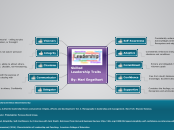
Skilled
Leadership Traits
By: Mari Engelhart
Self-Awareness
Consistently understands own emotions;
Acknowledges strengths, weaknesses, values and motives; Recognizes and adjusts actions based on feedback.
Adaptive
Consistently embraces change; Able to adjust to new situations and conditions.
Commitment
Sincere and obligated; Maximizes efforts to execute visionary goals
Confidence
Free from doubt; Believes in self; Mastery of skills and knowledge; Excellent decision-making skills.
Supportive
Considers the feelings, concerns and challenges of others; Recognizes and acknowledges the work of others.
Visionary
Passionate and curious; Entrepreneurial - willing to take risks; Has great ambition, imagination, or foresight
Integrity
Honest, ethical, trustworthy; Does not waiver personal convictions under pressure.
Charisma
Positive attitude; ability to attract others.
Sense of humor; Likeable, non-threatening.
Communicator
Communicates clearly and convincingly with the purpose of convincing others; Demonstrates skills is dealing with difficult or delicate situations.
Delegator
Empowers others; Allocates tasks to others; Confidently transfer the power to others.
